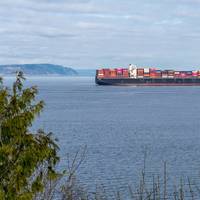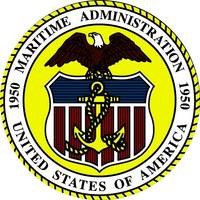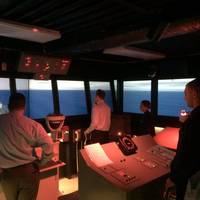US National Maritime Security Advisory Committee Appoints New Members

The U.S. Coast Guard announced the appointment of 13 individuals to serve as members of the National Maritime Security Advisory Committee (NMSAC).NMSAC was established in December 2018 to provide advice to the Secretary of the Department of Homeland Security on matters relating to national maritime security, including on enhancing the sharing of information related to cybersecurity risks that may cause a transportation security incident, between relevant Federal agencies and a) State…
Autonomous Shipping – Cyber Hazards Ahead
![A look at the typical areas most frequently seen as the scene of common accidents on board workboats. (source: European Maritime Safety Agency [EMSA])](https://images.marinelink.com/images/maritime/w200h200c/a-look-at-the-typical-105797.jpg)
If autonomous vessels are the future of maritime shipping, then cyber threats may be its Achilles heel. Congested shipping, restricted visibility, limited maneuverability, and intensive docking activities all contribute to port hazards – 42 percent of EU reported marine accidents (injury/death/damage to ships) took place in port areas and 44 percent of workboat fatalities occurred on Tugs. Autonomous shipping should provide numerous benefits including increased safety by relieving crewmembers of unsafe and repetitious tasks.
MSCI Advisory: Regional Conflict and Piracy

2019-007-Red Sea, Gulf of Aden, Arabian Sea, Gulf of Oman, and Indian Ocean-Violence Due to Regional Conflict and PiracyDescription:This revised advisory cancels U.S. Maritime Advisory 2018-0151. References: (a) U.S. Maritime Alerts 2018-001A, 2018-002A, 2018-002B, 2018-005A, and 2018-007A2. Issues: Regional conflict and piracy threats continue to pose potential risks to commercial vessels operating in the above listed geographic areas.3. Conflict in Yemen continues to pose potential risk to U.S.
Virtual Exercise Addresses Unsafe Migration by Sea

Thousands of migrants seeking refuge have lost their lives attempting to make their way across the Mediterranean Sea in overcrowded and unseaworthy boats. The United Nations estimates that as many as 850,000 refugees may attempt to make the trip between 2015 and 2016. Although most of the rescues have been handled by Coast Guard agencies in the region, merchant vessels often are being brought in to assist. Between 2014 and 2015, an estimated 1,200-plus merchant vessels were diverted to assist in the rescue of thousands of migrants making a desperate bid to reach Europe.
Security Advisory: Piracy – Revision of BMP4 High Risk Area
BIMCO says that the co-sponsors of BMP 4 have agreed to a revised definition of the High Risk Area. The revisions are effective and will formally apply as of 1 December 2015, in order to give shipping companies and crews time to adapt to them. It is strongly recommended that the revisions are taken into account as soon as possible for voyages through the VRA and HRA for which risk assessments are yet to be conducted, as the changes may have implications for charter party and insurance agreements as well as ship security. The revisions will be provided on industry websites, including www.bimco.org, as well as NATO Shipping Centre (www.shipping.nato.int) and MSCHOA (www.mschoa.org).
Hijacking for Product Theft is Business as Usual in Southeast Asia
Well-established local criminal syndicate diversifying its targets rather than undertaking new operations says Denmark-based security advisory and intelligence company Risk Intelligence. The recent hijacking cases of coastal product tankers in Southeast Asia for the theft of their cargos represent a diversification of the threat rather than a new trend. “It’s a case of new diesel in old tankers,” said the CEO of Risk Intelligence, Hans Tino Hansen. Hijacking for product theft can be documented as far back as 1990s in Southeast Asia. The most active syndicate has usually favored boarding the preselected targets in the same general location and always during the region’s dry season between March and October.
Will Watson joins AdvanFort as President

Maritime professional will lead the next generation of global security solutions. The AdvanFort Company today announced that maritime professional William Hughes (Will) Watson has joined the company as president. Will comes to AdvanFort from the Office of the Maritime Administrator of the Republic of the Marshall Islands (RMI) where he has been Deputy Commissioner of Maritime Affairs and Special Agent since 2009. Additionally, Will served as delegate of the RMI to the United Nations…
CPE Certified Port Executive Program Welcomes New Members

Capt. Jeffrey Monroe, MM, Chairman of the United States Department of Homeland Security Secretary’s National Maritime Security Advisory Committee, and former Chairman of the US Coast Guard’s National Maritime Safety Advisory Council, completed the first seminar for US port executives at the Philadelphia Maritime Exchange in Pennsylvania. This was the first program offered in the US by Canadian interests. Capt. Monroe, a licensed master mariner with a Master’s Degree in Transportation management…
J.F. Lehman & Company Adds Three Members to Operating Executive Board

NEW YORK – J.F. Lehman & Company, a leading middle-market private equity firm focused on the defense, aerospace and maritime sectors, is pleased to announce the addition of the Honorable Michael J. Bayer, General John D.W. Corley, USAF (Ret.) and Mr. Dean M. Flatt to its Operating Executive Board ("OEB"). The OEB is a group of seasoned industry and government executives who have significant experience in the firm's target industries. Through key relationships and sector-specific knowledge…
USCG Port Security Advisory for Libya
The U.S. Coast Guard, in light of civil unrest in Libya, issued a Port Security Advisory for Libya March 11, suggesting security measures for ships to take when calling upon Libyan ports. Civil unrest in Libya has prompted U.S. government concerns regarding whether port facility requirements of the International Ship and Port Facility Security Code are still being executed and maintained. The U.S. Directly report the actions taken to the cognizant U.S. Coast Guard Captain of the Port prior to arrival at a U.S. port. "The current security situation in Libya's ports is unknown at this time,” said Coast Guard Rear Adm. Kevin Cook, director of Prevention Policy. Implementing the above recommended security measures will generally expedite vessel entry into the U.
Guidance on Compliance with ITAR
The U.S. Coast Guard issued an updated advisory concerning the placement of firearms on U.S. vessels to defend against or deter pirate attacks in high-risk waters. The advisory summarizes issues related to compliance with the International Traffic in Arms Regulations (ITAR), the Gun Control Act, and the National Firearms Act, among others. Meeting the various conditions and obtaining the necessary permits is not easy, but it is no longer impossible. Port Security Advisory 4-09 (Rev 2) (11/4/09). (Source: Bryant’s Maritime News Service)
NMSAC Re-established
The US Coast Guard issued a notice stating that the Secretary of Homeland Security has re-established the National Maritime Security Advisory Committee (NMSAC). (Source: Holland & Knight)
NMSAC to Conduct Meeting
The National Maritime Security Advisory Committee (NMSAC), sponsored by the US Coast Guard, will conduct an on-line meeting on July 22. Topics on the agenda include the Transportation Worker Identification Credential (TWIC) Working Group, the Maritime Government Coordination Council, and the Maritime Sector Coordination Council.
Port Security Advisory Policy Change
The US Coast Guard issued Port Security Advisory 5-08. In a welcome change, the use of armed security guards on vessels that are subject to conditions of entry into US ports will no longer be automatic. Rather, such requirement may be imposed by the Coast Guard after considering the security compliance history of the vessel. In other words, keep good records of security actions taken during port calls in nations found to not maintain effective anti-terrorism measures. The Advisory also added three port facilities in Indonesia that have been excepted from the conditions of entry. (HK Law)
MARAD Advisory – Niger Delta area
The US Maritime Administration (MARAD) issued an advisory warning that extreme caution and vigilance should be exercised by ships operating in the Niger Delta area of Nigerian waters due to numerous acts of aggression against vessels and reports of excessive fines being levied by Nigerian Drug Enforcement Officers. US-flag vessels should refer to MARSEC Directive 104-6, Guidelines for US Vessels Operating in High Risk Waters. This directive is Sensitive Security Information (SSI), but may be obtained from your local USCG Captain of the Port (COTP), as indicated in a Federal Register notice. The MARAD Advisory may be obtained from the National Geospatial-Intelligence Agency (NGA) Internet site, but only after detailed searching.
AAPA: New Security Regulations Will Require Billions in Investment
Homeland Security Secretary Tom Ridge and the U.S. acts. security measures. Enhancing seaport security is a top priority for U.S. ports today. Homeland Security (DHS) which takes the lead on maritime security. international sea borders. cooperation and coordination and the funding to meet the law's intent. billion in the first year and $5.45 billion over ten years. heightened security. progress, sustained funds are needed. required under these new regulations. critical to our nation's defense and economic vitality. done with airports. to building a strong homeland defense. Congress to provide $400 million in grant funding in FY'05. funding. DHS from the public port industry perspective," noted Mr. Nagle. control systems as part of their port facility plans.
House Adopts Coast Guard and Maritime Transportation Act
Yhe U.S. House of Representatives adopted the Coast Guard and Maritime Transportation Act of 2003 (H.R. 2443). The measure was approved by the Transportation Committee on June 12, but only now reached the floor. It includes a manager’s amendment, offered by Representative LoBiondo (R-NJ), chair of the Subcommittee on Coast Guard and Maritime Transportation. A brief summary of the measure, as adopted, follows, emphasizing the changes from the earlier version. The authorized funding of the Coast Guard was increased to $4.865 billion for operation and maintenance and $1.147 billion for acquisition, construction, rebuilding, and improvement. This is $460 million more than the President requested. Of this amount, $70 million is for conducting the mandated U.S.
ASA: Helping Out in Security Matters
The American Salvage Association (ASA) has offered to assist the U.S. Coast Guard Captains of the Port in the development, review, and update of their Area Maritime Security plans required by the Secretary of Homeland Security. Marine salvage response in the event of a terrorist attack against a maritime target is a critical consideration in the development of any security effort. ASA is very supportive of the concept of the Area Maritime Security Advisory Committees and the development of maritime security response plans. Specifically, ASA proposes to nominate an ASA board member to serve on each of the Area Maritime Security Advisory committees. "It is our belief that by utilizing the U.S.
NY Security Advisory
The U.S. Coast Guard expanded the advisory notice issued Saturday to include all waters within 100 yards of the southern Manhattan Pierhead Line between the North Cove Yacht Harbor and the Brooklyn Bridge. Recreational vessels are not authorized to operate within this area, except for those requiring access to the North Cove Yacht Harbor. Ferries and charter boats that normally operate in this area and recreational vessels requiring access to the yacht harbor must contact the USCG. The East River Deepwater Range remains open to transiting commercial traffic. In addition, the security level for the security zone in the west channel of the East River at the United Nations Headquarters has been raised to MARSEC 2.
Coast Guard Issues Potential Terrorist Threat
The U.S. Coast Guard continues to work with local, state, and federal agencies to assess and improve port security throughout the region. Based on information received across the U.S. Government, there is a credible threat to maritime interests from swimmers and divers. The Captain of the Port Puget Sound has notified individual maritime industry and port authority stakeholders to heighten awareness and discuss appropriate security measures. This information does not change the Homeland Security Advisory System threat level. The threat level remains “yellow” (elevated). The Captain of the Port Puget Sound has established a communication network with local port authorities and marine industry leaders to report anomalous behaviors…
GOVERNMENT: Terrorism Threat and the Immediate Reaction
by Dennis L. When the federal government began examining United States vulnerabilities in the days following the horrific terrorist attacks of September 11, 2001, it quickly became apparent that significant weakness existed on the U.S. maritime borders. Many, but not all, of these weaknesses were systemic and derived from both the U.S. open society and the procedures underlying modern maritime commerce. The goal quickly became to reduce the risk of maritime terrorism while not fundamentally altering the efficiencies of the commercial system. It was quickly realized that the threat to the maritime sector consisted of two distinct types: explosives and other contraband being shipped as cargo (particularly in a container) and the ship being used as a weapon…
Port Security Advisory – Nations with Inadequate Port Security Measures
The U.S. Coast Guard issued a Port Security Advisory listing nations it has determined to have inadequate port security measures. Ships that have called in any of those nations within the five previous port calls may be subject to increased port state control examination upon arrival in a U.S. port. The enhanced examination may be lessen if the ship establishes a higher security level during the port call, executes a Declaration of Security, logs all security actions in the ship’s log, and reports the actions taken to the USCG Captain of the Port (COTP) prior to arrival in the U.S. port. The nations found to have inadequate port security measures are: Albania…
USCG Updates Boarding Target Lists
The Coast Guard has updated security targeting information for foreign flag vessels, which includes a vessel’s flag state administration and last five port of calls. The revised information is provided on the following web site: http://www.uscg.mil/hq/g-m/pscweb/index.htm. The information for flag states and recognized security organizations will be updated monthly until the end of the year. Targeting statistics will be compiled annually and published in an annual report starting in 2005. Flag administrations whose names appear on the targeted flag state list have demonstrated a below average compliance rate in the United States for security since July 1. Foreign vessels flying these flags can expect increased scrutiny and boardings based on this information.





